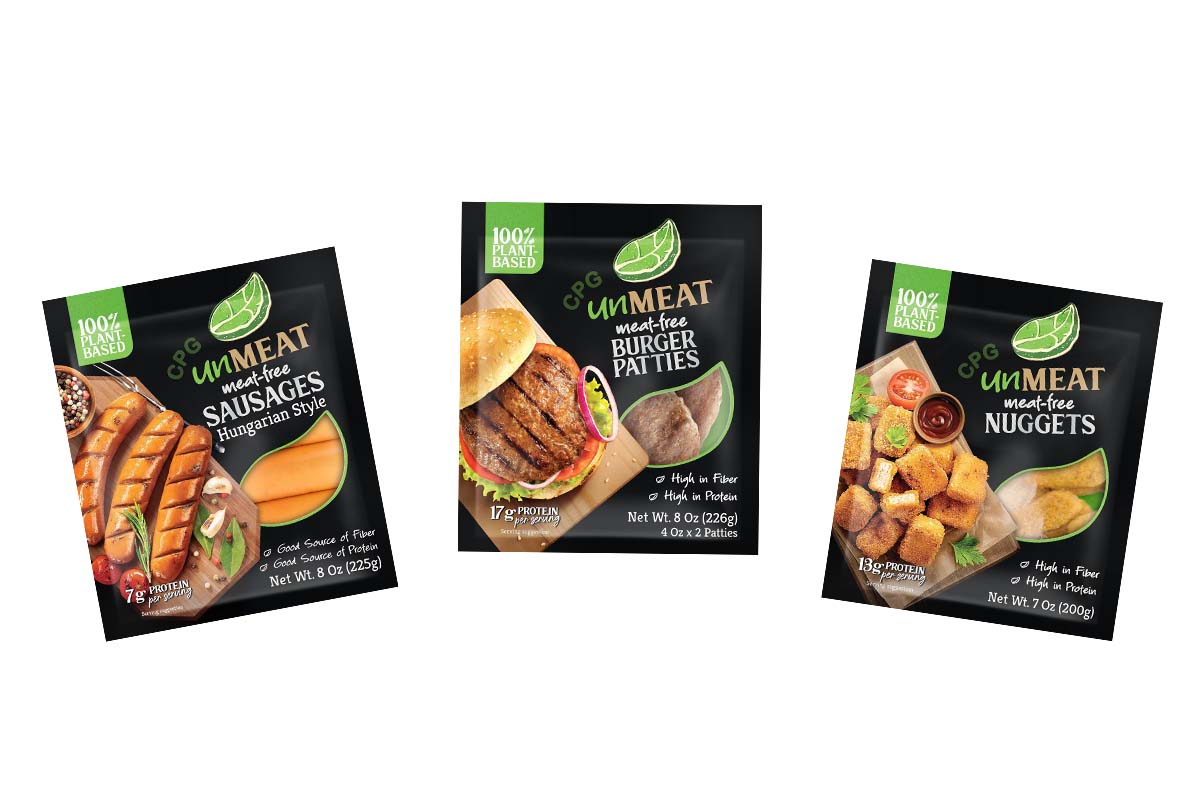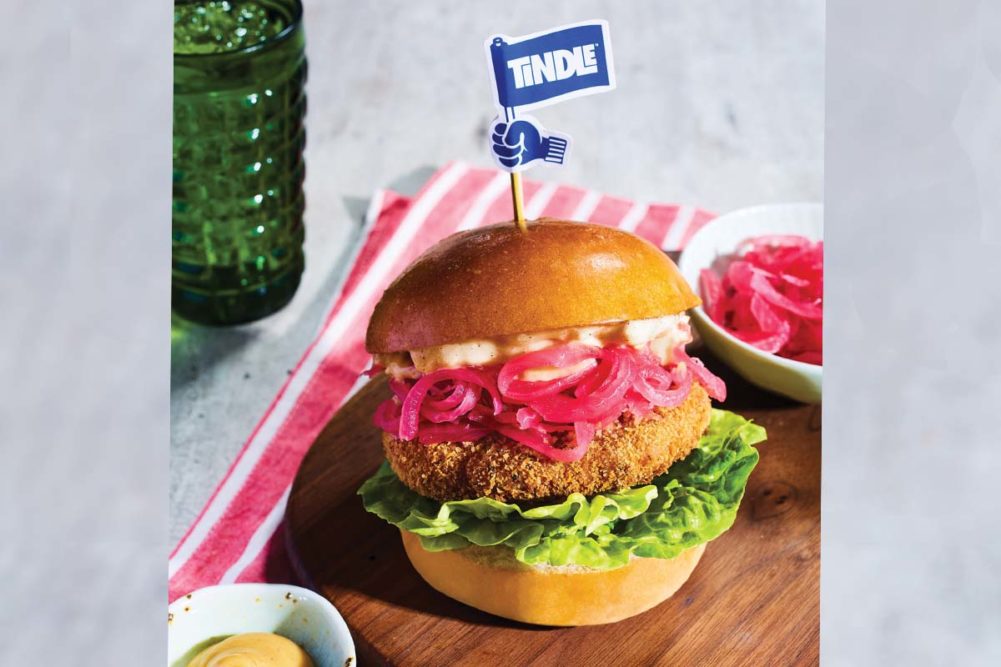There’s no denying that plant-based meat alternatives have carved out a spot in the center-of-plate protein sector. The unknown is: will the category ever become more than a niche in this space? Yes, it currently is a niche, despite all the hype in the media and trade. This is why some innovators are betting their success in foodservice, where consumers are often more willing to try something new prepared by a culinary professional. Consumers also don’t see the ingredient statement.
The Market
The Plant Based Foods Association, San Francisco, reported that in 2021, the meat-alternative sector experienced $1.4 billion in sales. Now, while the data showed growth of 74% during the past three years, that is just a smidgeon of combined fresh ($81.9 billion) and frozen ($15 billion) meat, poultry and seafood retail dollar sales, according to IRI, Chicago, which totaled $96.9 billion in 2021.
The most current sales data from IRI suggests that plant-based is losing traction at retail. May 2022 meat alternative unit and volume retail sales were down year-on-year by 10.0% and 7.3%, respectively.
“Combined refrigerated and frozen plant-based meat alternatives generated $118 million (according to IRI) in retail sales during the five May 2022 weeks,” said Anne-Marie Roerink, president, 210 Analytics LLC, San Antonio, Texas. “This moved sales down 0.9% behind May 2021 levels. Additionally, dollar gains were boosted by the inflation predominantly seen in frozen – not as much in refrigerated – meat alternatives.”
Refrigerated items, commonly merchandised in the meat or produce departments, saw accelerated sales growth pressure in May 2022. The five-week period saw $41.8 million in sales, down 16.1% versus a year ago and 16.3% versus two years ago.
Frozen meat, poultry and seafood alternatives sales reached $76 million in May 2022. This is about $34 million more than refrigerated alternatives. It’s also an increase of 10.1% versus a year ago. It is important to note that this increase came from inflation. Units and volume were down year-on-year.
“Plant-based meat alternatives remain mostly an occasional choice, with only 9% of consumers reporting to eat them weekly in 2021,” said Roerink, author of The Power of Meat 2022 study. “Those who buy them believe they are healthier than meat and a good source of protein.
“When it comes to the idea of cultivated meat, consumers remain somewhat skeptical about the idea, with 40% unwilling to try versus 29% being open to the concept,” Roerink said. “Concerns center on feeling it is not natural (63%), too processed (48%) and not safe (46%). But those in favor like the idea of securing the food supply (41%) and feel it could be better for their health (41%).”
Form and delivery
Patties and burgers lead the plant-based meat category as the top-selling product type, according to the Plant Based Foods Association. At the same time, the fastest-growing formats in 2021 were balls, nuggets, tenders, cutlets and deli slices. In fact, plant-based chicken-type products were a growth leader in 2021, with probably more brands trying to enter the marketplace than there are currently brands of real chicken nuggets, tenders and cutlets in the marketplace. This oversaturation of the market is likely cannibalizing sales for individual brands and soon, only a handful of the best plant-based products will survive.
This is why foodservice is attractive. Chicago-based Technomic reported that one-third of Millennial and Gen Z restaurant diners are seeking out vegetarian/vegan entrées as a first choice on menus, as are 27% of older adults. Most major fast-food and quick-service chains include at least one plant-based option, with some new players only being plant based. Institutional settings, namely university meal halls, typically have multiple plant-based options to meet the dietary needs of an increasingly diverse student population.
 (Source: UnMEAT)
(Source: UnMEAT)
Breakthrough foodservice concepts
Technomic research showed that 42% of consumers are more likely to try a new or unique flavor from a restaurant than when cooking at home. The data showed that consumers order new or unique items from restaurants more than 25% of the time.
That’s what Singapore-based Next Gen Foods is counting on with its one and only offering: Tindle plant-based chicken, a product designed by chefs and for chefs. The company showcased Tindle at the National Restaurant Show held in Chicago May 21-24. Tindle is a versatile, uncooked product that chefs can form into everything from patties to balls to strips and more.
To encourage trial by chefs, the company is sponsoring events such as the Chicago Blended Burger Challenge, which took place May 1 in Chicago. Ten chefs from across the country and all backgrounds stepped into the ring to create a blended burger made with Tindle and a pantry of other ingredients provided by Whole Foods Market, Austin, Texas.
Daniel Espinoza, corporate chef at ofi (Olam Food Ingredients) in the Chicagoland area, was a winner with what he called a Chicago-style Tindle burger. The patty was made with a 50/50 blend of ground chicken thighs and Tindle. He added drained giardiniera oil to the blend, along with salt, pepper and paprika prior to searing the patty. The cooked burger was topped with house-made giardiniera mayonnaise, griddled onions and bacon (the real deal).
Next Gen Foods describes Tindle as a clean-label product made with only nine ingredients. After water, texturized protein – a combination of soy, wheat gluten and wheat starch – forms the base of the product. Coconut oil, methylcellulose and oat fiber help hold it all together, while also providing succulence. Tindle gets most of its flavor from a proprietary ingredient called lipi, which is a combination of sunflower oil and natural flavors designed to simulate real chicken fat.
That list of ingredients may still be considered too long and complex on a retail product, another reason foodservice is becoming a destination for plant-based innovators. One particular multifunctional ingredient that has come under much scrutiny in this space is methylcellulose.
“The one ingredient that many meat alternative companies are trying to replace is methylcellulose,” said Brock Lundberg, president of applications and research and development, Fiberstar Inc., River Falls, Wis. “No one-to-one ingredient replacement exists for methylcellulose because of its unique functionalities.”
This water-soluble polymer is chemically derived from the plant-based fiber cellulose. It is used as a binder, thickener, emulsifier, stabilizer and gelling agent to prevent syneresis, where one of its key performance features is its ability to form a thermoreversible gel. Use also prevents labeling a product as all natural.
On Tindle’s website, the company describes methylcellulose as “a culinary binder derived from cellulose, found in plants. Think of it as a plant-based egg white.”
Fiberstar has launched new methylcellulose-free solutions that are next-generation texturizing citrus fiber ingredient systems. They are intended to be used with specific plant-based proteins, namely potato and canola. The system provides firmness, thickening power and meat-like texture.
“We cater to a variety of customers ranging from those who need allergen-free options to those who are trying to create healthier products without coconut or palm fat,” said Haen. “These plant proteins work synergistically with our citrus fiber to create the meat-like texture, succulence and hot bite that customers expect.”
Vegan food manufacturer Upton’s Naturals, Chicago, is bringing quick-cooking, seitan meat substitutes to restaurants and foodservice customers across the country through its partnership with Dot Foods, Mount Sterling, Ill. Based on vital wheat gluten, the pre-seasoned, plant-based offerings require little-to-no-prep and work in a variety of recipes ranging from nachos and quesadillas to pizza and gourmet hot dogs. Each high-protein, low-fat product is also 100% vegan, kosher pareve, certified plant based, contains no GMOs, and is free of the cholesterol associated with meat.
“Crafted with clean, quality ingredients, our seitan possesses impressively meat-like texture and robust flavor that chefs can feel proud to work into their plant-based menu options,” said Upton’s Naturals’ founder Dan Staackmann.
Something important for formulators to remember is that the quality and characteristics of the plant protein source affect how much formulators will need to rely on flavor maskers, texturants or mouthfeel enhancers. The higher the protein content, the more influence the ingredient has on the alternative’s sensory properties.
There’s been a lot of activity in plant-based bacon, where fat – usually coconut based – is the dominant ingredient, so flavor masking is not much of an issue. While many believe that everything tastes better with bacon, everything also tends to taste better with coconut oil. It’s rich and flavorful and has a similar fatty acid profile to animal fats.
AAK, Edison, NJ, developed a unique blend of sunflower oil and coconut oil to create crispy, sizzling bacon without the oink. The sunflower oil supports slice flexibility and lubricity, while the coconut oil gives the slice structure, firmness and integrity. Oils are released during the cooking process, not unlike pork fat. The company suggests also using a coconut oil ingredient applied as a topical coating to the slices to enhance bacon fry-ability and to ensure the finished, cooked texture is achieved.
Sri Artham, founder, Hooray Foods, San Francisco, developed plant-based bacon because he knows everything tastes better with bacon, but not everyone can eat pork. Made with seven simple ingredients – coconut oil, rice flour, tapioca starch, liquid smoke, maple syrup, umami (mushroom) powder, sea salt and beet juice concentrate – the strips look, cook and taste like pork bacon.
“The biggest advantage of being clean label is accessibility, as our bacon is free of soy, dairy and gluten,” said Artham. “It helps us bring our product to more people with dietary restrictions and allergies. When it comes to pork bacon, many people are also concerned about nitrates and hormones. Because our plant-based version is nitrate-free and hormone-free, this creates another opportunity to reach those consumers and provide them a cleaner alternative.
“Raising animals for food is the second-largest contributor to greenhouse gas emissions,” said Artham. “As our bacon is solely made from plants, it becomes easier on the planet. And although our product does contain saturated fat, there is no cholesterol, so you can still be kinder to your body when enjoying a comfort food.”
World Finer Foods, Bloomfield, NJ, presented culinary professionals at the National Restaurant Show with a new concept in plant-based products: Cutting Vedge. The company partnered with chefs to unlock a world of flavor, through real ingredients that deliver on taste, texture and protein.
The veggie-forward product comes in balls, crumbles, patties and sausages. Artichokes are the lead ingredient, supported by a nutritious mix of spinach, quinoa and chickpeas. Artichokes boast a hearty texture and function as a carrier for different flavors.
Right before the National Restaurant Show, gearing up for the summer hot dog season, Chicago-based fast-casual chain Portillo’s added the plant-based Garden Dog hot dog to its menu. The product features the Signature Stadium Dog from Field Roast Grain Meat Co., Seattle. It is a pea protein-based hot dog with the flavors of kosher-style beef hot dogs. Unlike products that use liquid smoke, the links are smoked using maple hardwood chips and both steam and dry heat. The plant-based hot dog also offers a similar amount of protein per serving as most traditional hot dogs but contains less sodium and are made without nitrites or GMOs.
“When we first started thinking about bringing a plant-based hot dog to our menus, we tasted dozens of different versions. It became clear that Field Roast produces the best product on the market,” said Michael Osanloo, chief executive officer and president of Portillo’s. “When Field Roast customized its Signature Stadium Dog just for us, we knew we had a winner.”
“It’s outselling all of our expectations right now,” Osanloo told financial analysts at the William Blair Growth Stock Conference. He said that more than 60 Garden Dogs were being sold at each restaurant every day, “which is pretty darned good.”
 Field Roast Grain Meat Co.'s pea protein-based hot dog, inspired by the flavors of kosher-style beef hot dogs, were recently added to the menu of Portillo's, a fast-casual chain based in Chicago. (Source: Field Roast Grain Meat Co.)
Field Roast Grain Meat Co.'s pea protein-based hot dog, inspired by the flavors of kosher-style beef hot dogs, were recently added to the menu of Portillo's, a fast-casual chain based in Chicago. (Source: Field Roast Grain Meat Co.)
Safety, quality top of mind
An important quality that formulators must consider is the safety and shelf life of these alternative products. While some of the traditional food safety and quality ingredients used in real meat have application in alternatives, there are special considerations.
“Fat systems are a key component of great-tasting, plant-based meat alternatives, yet the oxidation of fat and oil components in these products is a common challenge for brands,” said Courtney Schwartz, marketing director at Kemin, Des Moines, Iowa. “It can be very difficult to deliver the texture and flavor consumers desire if your product isn’t properly protected from oxidation at the onset of production.”
There’s a range of plant-derived ingredients based on acerola, rosemary and green tea extracts that function as alternatives to commonly used synthetic antioxidants. They assist with retarding the oxidation of fats and oils in foods, thereby preventing the development of stale, old, rancid tastes and smells. They may even help with color management and food safety.
Chr. Hansen, Milwaukee, Wis., now offers a range of food safety cultures that can be applied alone or in combination to undergo fermentation in plant-based meats. They assist with keeping yeast, mold and pathogens such as Listeria at bay.
“Plant-based meat alternatives tend to have high levels of sodium, due to the addition of buffered vinegars or different salts used for food preservation, such as sodium acetate or sodium lactate,” said Zdenek Cech, business development manager for plant-based meat alternatives at Chr. Hansen. “With our new cultures, producers may be able to reduce the sodium content in their products, relying on the power of fermentation technology to support shelf stability so foods remain safe and fresh, naturally.”
MycoTechnology Inc., Aurora, Colo., removes some of the food safety and quality hurdles by using fermentation and moisture management through dehydration. Drying assists with keeping chemical-sounding – artificial and natural – preservative-type ingredients out of formulations.
MycoTechnology’s Goodside Foods brand does this with its new meatless shelf-stable crumbles. The product is made with three ingredients: pea and rice protein that gets fermented by shiitake mushroom roots, or mycelia. This natural fermentation process makes the plant protein in these meatless crumbles tastier and easier to digest, according to Lisa Wetstone, director – innovation and growth strategy. The crumbles are convenient for chefs to keep on hand, and they may be crafted into protein-rich meals by simply adding water.
Maija Itkonen, co-founder and chief innovation officer at Gold&Green, a Finnish company that produces protein granules and protein flakes, said “We know the demand for clean label and sustainably sourced food is only going to increase. We’ve been able to merge our innovative technology with clean, naturally nutritious ingredients.”
Also made from only three ingredients – oat bran, pea and fava bean protein – the shelf-stable proteins may be hydrated and blended with other ingredients to form products such as burgers, patties and balls.



